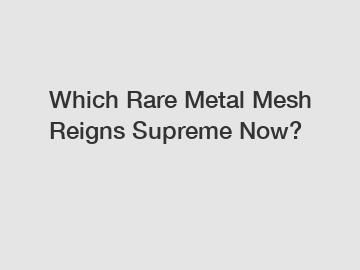Which Rare Metal Mesh Reigns Supreme Now?
Which Rare Metal Mesh Reigns Supreme Now?
Rare metal mesh has become increasingly popular in various industries due to its unique qualities and wide range of applications. From aerospace engineering to medical devices, these meshes play a crucial role in enhancing performance and durability. However, with so many options available, it can be challenging to determine which rare metal mesh is the best choice for your specific needs. In this article, we will explore some of the most commonly used rare metal meshes and discuss their advantages and disadvantages, ultimately determining which one reigns supreme in today's market.
1. Titanium Mesh: Strength and Versatility.

Titanium mesh is a highly sought-after option due to its exceptional strength and versatility. It is widely used in aircraft structures, medical implants, and even in the production of sports equipment. Titanium meshes offer high corrosion resistance, making them suitable for applications in harsh environments. Additionally, their low density contributes to lightweight designs, improving fuel efficiency and performance in aerospace applications. However, titanium mesh can be expensive to produce, which can limit its widespread use in certain industries.
2. Tungsten Mesh: High-Temperature Stability.
Tungsten mesh, known for its extraordinary heat resistance, is commonly employed in high-temperature applications such as furnace screens and electrodes for welding. Tungsten's high melting point allows it to withstand extreme temperatures, making it an ideal choice in industries that require heat resistance and long-term stability. However, tungsten mesh can be relatively brittle and difficult to work with, posing challenges during fabrication and installation processes.
3. Nickel Mesh: Excellent Conductivity.
Nickel mesh is widely recognized for its excellent electrical conductivity, and it finds extensive use in industries such as electronics and telecommunications. It provides stable performance in electromagnetic shielding and also exhibits good corrosion resistance. Moreover, nickel mesh can be easily formed into complex shapes, making it particularly suitable for intricate applications. However, one downside to consider is its limited resistance to high temperatures, which may restrict its use in certain environments.
4. Stainless Steel Mesh: Durability and Cost-Effectiveness.
Stainless steel mesh is a popular choice across various industries due to its durability, affordability, and wide availability. It is highly resistant to corrosion and offers good mechanical strength, making it suitable for applications where cleanliness and longevity are crucial, such as filtration systems and architectural designs. While stainless steel meshes may lack the exceptional qualities of titanium or tungsten, their cost-effectiveness and versatility make them a preferred option for many.
Conclusion:
Considering the unique properties and applications of different rare metal meshes, it is clear that each option brings something valuable to the table. Titanium mesh excels in strength and versatility, tungsten mesh stands out in high-temperature stability, nickel mesh showcases excellent conductivity, and stainless steel mesh offers unmatched durability and cost-effectiveness.
Ultimately, determining which rare metal mesh reigns supreme now depends on your specific requirements and priorities. Whether you prioritize strength, heat resistance, conductivity, or affordability, there is a rare metal mesh that can meet your needs.
If you have any further questions or would like assistance in choosing the right rare metal mesh for your application, please do not hesitate to contact us. Our team of experts is ready to provide guidance and support to ensure you make an informed decision that aligns with your goals.
Contact us to discuss your requirements of Monel Wire Mesh Features, Duplex Stainless Steel Wire Mesh, Incoloy Woven Mesh. Our experienced sales team can help you identify the options that best suit your needs.
163
0
0

Comments
All Comments (0)